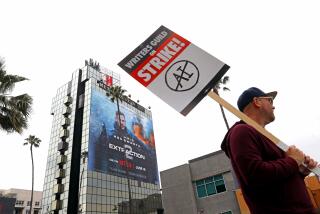Saving online radio
- Share via
THE ROYALTIES and fees owed by online radio stations will increase substantially Sunday, the first in a series of hikes that threaten to put much of the industry out of business. But webcasters got a stay of execution this week when SoundExchange -- the royalty-collection agency for most record labels and artists -- pledged not to enforce some of the most onerous new provisions while negotiations continued.
The provisional reprieve is appropriate, given how much the music industry and webcasters need each other. The new rates are almost completely unrealistic; by one analyst’s estimate, they will consume more than half of the average webcaster’s music-related advertising revenue.
Those rates were set by a federal Copyright Royalty Board that made a number of mystifying choices. It set a minimum annual fee of $500 per station, which would force a handful of companies with multiple outlets to cough up more than $1 billion. And it required small commercial webcasters and popular noncommercial stations to pay the same rates as online broadcasters large enough to attract big-name national advertisers.
SoundExchange initially defended the royalty board’s work as if it were an accurate measure of music’s market value. Lately, however, there are encouraging signs that the agency will give up that charade and focus on deals that make sense for all concerned. On Friday it publicly abandoned the minimum-fee bonanza, accepting a $50,000 annual cap. It also offered to extend its previous agreements with small commercial webcasters, which pay 10% to 12% of their revenue in royalties, and with nonprofit stations, which pay a flat fee.
At least three things need to happen to ensure that these proposals become concrete deals. SoundExchange should take a more conciliatory approach to companies that are purely webcasters, accepting a reasonable percentage of their total revenues no matter how large or popular they may be. In return, webcasters need to start reporting reliably on what they play and the size of their audience. Finally, webcasters with growing advertising revenues should find a way to share their success with labels and artists.
This is the second time webcasters have been rescued by last-minute compromises. It’s time for both sides to find a new way to negotiate so that brinkmanship can be replaced by partnership.
More to Read
The biggest entertainment stories
Get our big stories about Hollywood, film, television, music, arts, culture and more right in your inbox as soon as they publish.
You may occasionally receive promotional content from the Los Angeles Times.










